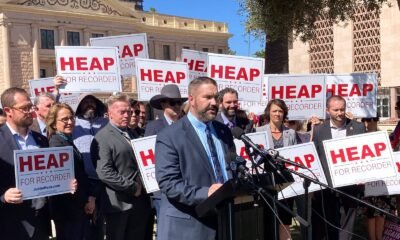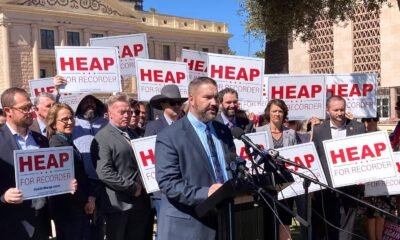Education
Measles Resurgence: Vaccine Shortfalls Put Pima County Children at Risk

A measles outbreak in Texas has led to 159 confirmed cases and, tragically, the death of an unvaccinated child—the first such measles-related fatality in the U.S. in a decade. Experts warn that if the outbreak spreads to Arizona, Pima County could be at particular risk due to declining immunization rates among children.
The measles virus is highly contagious and can have deadly consequences, but effective vaccines can prevent its spread if community coverage remains high. In Texas, the outbreak primarily affects unvaccinated school-aged children, as indicated by the Texas Department of State Health Services. While no cases of measles have been documented in Arizona since last year, the virus is approaching the state’s borders, with nine cases reported in New Mexico and three in California.
Pima County health officials currently have limited vaccine supplies, administering the measles, mumps, and rubella (MMR) vaccine primarily to young children. Adults seeking vaccinations should consult their doctors or local pharmacies, with available doses at Walgreens and CVS clinics.
The Centers for Disease Control and Prevention (CDC) recommends maintaining an MMR vaccination rate of at least 95% to prevent outbreaks. However, Pima County’s vaccination rate for kindergartners has fallen to 92.8%, below the recommended threshold. Crystal Rambaud of the Pima County Health Department has noted that any dip below 95% raises the potential for community transmission of the disease.
Enrollment in Arizona public schools requires several vaccinations, including two doses of the MMR vaccine. Parents can opt for “personal beliefs exemptions,” acknowledging the risks but choosing not to vaccinate. Medical exemptions are available for those with documented health concerns or natural immunity from past infections.
Vaccination rates for MMR in Pima County have been declining since 2019, from 95.6% to the current rates, with an increase in parents seeking personal belief exemptions. Rambaud attributes part of this decline to misinformation surrounding vaccines, especially heightened by the disruptions during the COVID-19 pandemic.
The MMR vaccine is highly effective, offering a 93% protection rate after one dose and 97% after two. Yet, the current situation indicates that 2% of measles cases nationwide involve individuals who are fully vaccinated. Most children receive their first MMR dose at 12 months and their second between ages four and six, but infants are unprotected in their early months.
Measles, a highly contagious disease, spreads through airborne droplets from infected individuals. Symptoms usually manifest within one to two weeks and include high fever, cough, and a rash. Severe complications can arise, leading to pneumonia or encephalitis, with the disease exhibiting a higher transmission potential than even COVID-19.
Arizona ranks low in MMR vaccination rates for kindergartners, placing 13th lowest in the U.S., which is concerning given the ongoing outbreak in Texas. With 82% of children in the Texas region where the outbreak originated unvaccinated, Pima County’s 92.8% presents a precarious situation.
Among the top ten schools in Pima County with the lowest immunization rates, nine are private, with seven being faith-based institutions. This discrepancy underscores the challenges in achieving vaccination compliance across varying school environments.
Misleading claims regarding vaccines have been propagated by various figures, including Robert F. Kennedy Jr. His previous assertions about measles vaccines being unnecessary have shifted recently, as he now advocates for vaccination to promote community immunity. Meanwhile, local pediatricians like Dr. Jeff Couchman and Dr. Joy Peskin report increased vaccine hesitancy among parents since the pandemic, often stemming from misinformation linking vaccinations to autism—debunked by numerous studies.
Pima County vaccine clinics currently offer the MMR vaccine only to young children due to supply shortages. Adults interested in vaccination are encouraged to consult their doctors for guidance on accessing the vaccine, while clinics serve uninsured individuals and those on AHCCCS. Local pharmacies confirm they have MMR doses available, advising people to check availability before attending.


















